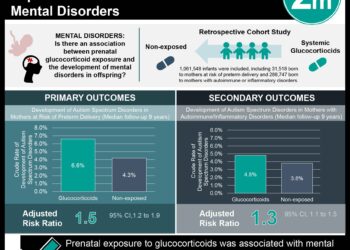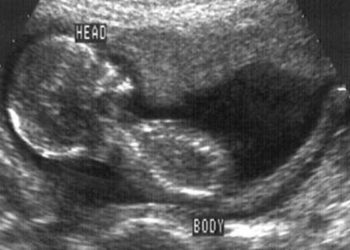Budesonide linked with decreased bronchopulmonary dysplasia in preterm infants
1. Preterm infants (gestational age <28 weeks) treated with inhaled budesonide within 24 hours of delivery had a significantly decreased incidence of bronchopulmonary dysplasia and mortality at 36 weeks postmenstrual age.
2. The above finding was driven by a significant decrease in the rate of bronchopulmonary dysplasia in the budesonide treatment group; however, this was offset by a nonsignificant trend towards increased mortality in the treatment group.
Evidence Rating Level: 1 (Excellent)
Study Rundown: Preterm infants (gestational age <28 weeks) are at high risk of bronchopulmonary dysplasia, a major cause of early death and sequelae of neurodevelopmental delay and respiratory disorders. While systemic glucocorticoids have been used to reduce the incidence of this problem, they may be linked to risks of intestinal perforation and cerebral palsy. This randomized controlled trial investigated the use of inhaled budesonide compared to placebo in 863 preterm infants when applied within 24 hours of birth and continued either until no longer needing oxygen pressure support and or until postmenstrual age of 32 weeks 0 days.
The authors found that there was a significant decrease in the incidence of the primary outcome, a composite of death or bronchopulmonary dysplasia at 36 weeks of postmenstrual age, in the inhaled budesonide group versus placebo. This finding was driven by a significant decreased incidence of bronchopulmonary dysplasia in the treatment group; however, this was offset by a statistically non-significant trend towards increased mortality in this group as well. This trial provides some evidence for the benefits of using inhaled budesonide within 24 hours after birth of preterm infants. Additional data must be culled from this cohort to elucidate the longer-term effects of early budesonide intervention.
Click to read the study, published today in NEJM
Relevant Reading: Early administration of inhaled corticosteroids for preventing chronic lung disease in ventilated very low birth weight preterm neonates
In-Depth [randomized controlled trial]: This study involved 863 neonates from 40 centers in 9 countries. The average ages of the mothers in the budesonide versus placebo group were 30.7 versus 30.8 years, and gestational ages of infants were 26.1 versus 26.1 weeks. The primary outcome was death or bronchopulmonary dysplasia (diagnosed by an oxygen-reduction test) at a postmenstrual age of 36 weeks. In the budesonide compared to placebo group, the rates of primary outcome were 40.0% and 46.3% respectively (RR, stratified according to gestational age, 0.86; 95% [CI], 0.75 to 1.00, p=0.05). Separately, the rates of bronchopulmonary dysplasia were 27.8% versus 38.0% (RR, stratified by gestational age, 0.74, 95% [CI], 0.60 to 0.91, p=0.004); the rates of mortality were 16.9% versus 13.6% (RR, 1.24, 95% [CI], 0.91 to 1.69, p=0.17). In terms of secondary outcomes, the frequency of a patent ductus arteriosus requiring surgical ligation was also significantly reduced in the budesonide group (RR, 0.55, 95% [CI], 0.36 to 0.83, p=0.004), as was the need for reintubation following the last administration of study drug. There were no significant differences in terms of some specifically tracked adverse outcomes including retinopathy of prematurity, brain injury, necrotizing enterocolitis, and infections.
Image: PD
©2015 2 Minute Medicine, Inc. All rights reserved. No works may be reproduced without expressed written consent from 2 Minute Medicine, Inc. Inquire about licensing here. No article should be construed as medical advice and is not intended as such by the authors or by 2 Minute Medicine, Inc.









